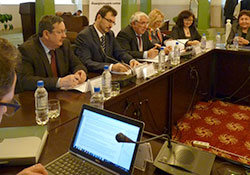WHO project contributes to significant improvement of paediatric care in Tajikistan

WHO
A WHO project funded by the Russian Federation has succeeded in improving the standard of paediatric care provided by hospitals in the Khatlon region of Tajikistan. The results of the project and opportunities to scale up best practices were discussed at a roundtable with stakeholders held in Dushanbe on 28 November 2014. Among the achievements discussed were a reduction in the rate of unjustified hospitalizations from over 60% to 18% and a decrease in the number of procedures implemented, including injections. The hospitals have also dramatically rationalized their use of medicines for treatment of major childhood illness.
“Improving and strengthening the quality of paediatric services in Tajikistan is one of the critical areas for reducing child mortality and improving sustainability of health system development. The project allowed Tajikistan to scale-up implementation of Integrated Management of Childhood Illness (IMCI) strategy from community and primary care level to hospital level. WHO, in partnership with the Ministry of Health and other development partners, will continue to work in this area in line with the regional Health 2020 policy framework and national strategies,” said Dr Pavel Ursu, WHO Representative/Head of the WHO Country Office in Tajikistan.
Project deliverables
Overall achievements of the “Better health for Tajik Children” project also include:
- adaptation and dissemination of the WHO pocket book for provision of hospital care for children, which was endorsed as a national guideline for management of common childhood illnesses;
- provision to hospitals of wall charts for triage and emergency care, and CDs with training materials;
- training of over 250 health care workers and academic faculty followed by supportive supervision visits;
- changes in the physical structure of the hospitals, making life-saving equipment more easily accessible and allowing direct admission to emergency wards for treatment;
- improving access to essential equipment through provision of 340 items of equipment and 7000 necessary supplies to 10 pilot hospitals;
- improving teaching of medical students on principles and guidelines of quality hospital care for children;
- establishment of a resource training centre to further institutionalize evidence-based paediatric care approaches for academia and clinical practice.
Protection of children’s rights
A survey on the quality of care and protection of children’s rights in the pilot hospitals conducted as part of the project has empowered hospital staff and management to make necessary changes. Since the survey, more hospitals have improved safety and the physical environment, trained staff in protocols and procedures for pain prevention and management, added equipped playrooms and initiated a system to investigate and give feedback on children’s and adolescents’ complaints.
Scaling up of best practices
Lessons learnt from the project can be scaled up within the country and internationally. WHO has already initiated a similar project for improving paediatric care in other countries in central Asia and Africa. Improving the quality of paediatric services will play a key role in progress towards achieving the Millennium Development Goals.



